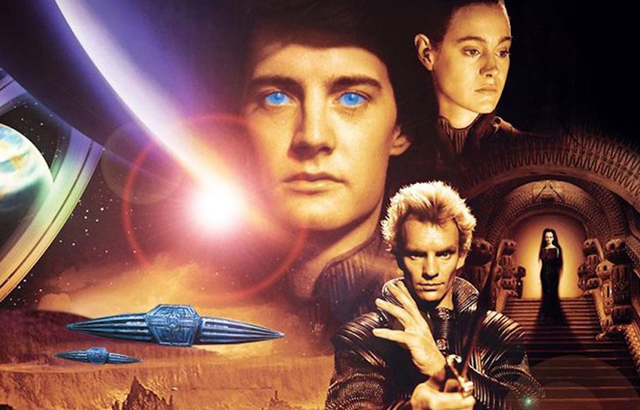
Science Fiction is largely seen as a primary genre within cinema, but it doesn’t quite get the same amount of respect as a great pillar of the literary world. Sure, sci-fi literature is as successful of a genre in bookstores as anything else, but it’s only in recent years that science fiction has gained the due respect of the literary world that usually has been reserved for what is considered “high art.” Now no longer dismissed as commercial, science fiction writers like Asimov, Heinlein, and Bradbury are now spoken about in the same esteem as the likes of Dickens, Fitzgerald, Joyce, and Faulkner. And indeed, the influence of the 20th Century’s most celebrated science fiction writers are having a profound effect on cinema itself, as their work is sought after more and more for adaptation, and is often referenced multiple times by filmmakers who were inspired by their work. Of all the most celebrated works of science fiction from the last century, one that particularly stands out as the most fascinating and influential of all is the 1965 novel Dune, written by American author Frank Herbert. Herbert’s Dune is so highly regarded in literary circles that it’s often been called the Lord of the Rings of science fiction. That comparison is fairly apt because like J.R.R. Tolkein’s masterwork, Dune is a immensely detailed chronicle of a people, a culture, and a place that feels foreign yet familiar, and it absorbs the reader into it’s world. Upon reading Dune, you become wrapped up in the internal politics of a galactic empire that spreads across the cosmos and take in the sights, feels, and yes even smells of each new planet the story visits, as Herbert spends a meticulous amount of time describing his world to you, in that same Tolkein-esque way. it’s a masterpiece of world building literature and rightly has earned it’s reputation as a touchstone of science fiction. But, as remarkable a reputation Dune has claimed within literature, it’s road to the big screen has been a problematic one, even though it’s influence throughout the sci-fi genre is widespread. And in one particular case, we’ve also seen how difficult it truly can be to do the writing of Frank Herbert justice through a cinematic interpretation.
Dune is, like Lord of the Rings, a dense and complex book, though not particularly in a narrative way. It’s basically an Arthurian legend combined with super hero origin. The stakes are made very clear, and the heroes and villains are easily defined. Where the complexity rises is from the way that Herbert describes the internal politics and the ecology of the desert planet that makes up the setting of the story and it’s title; the planet Arrakis, also known as Dune. Arrakis is one of the most fantastic worlds ever dreamed up for any form story-telling; a desolate world that holds so much influnence for the whole of society because it’s primary export, the Melange spice, is the most important resource in the galaxy, and it is only produced on Arrakis. The spice heightens mental consciousness, enhances human evolution, and enables interstellar flight, and the galactic empire that has discovered how to mine the spice has thrived because of it. But, the result of the spice’s importance has been the growing desire to control it, and this has led to a feudal society where great houses go to war with each other in order to gain control of the spice. In particular, the Houses of Atreides and Harkonnen are the ones jostling for power, with the emperor, Shadam IV, using the governance of Arrakis as means of subduing a potential rival to the throne. At the same time, a coven of spice enhanced witches named the Bene Gesserit have been managing selective breeding among the noble houses in the hopes of creating the next step in human evolution, creating a super being known as the Kwisatz Haderach, who can channel mental awareness beyond the limits of both male and female consciousness. And despite their intentions of finding this being among the Bene Gesserit themselves, the most promising candidate has instead turned out to be the son of Duke Leto of House Atreides; Paul. Paul Atreides rises to become a messiah like being through the course of the story, gaining immense mental powers as well as the loyalty of the native people of Arrakis, the Fremen, and with that, he challenges the hold of the empire over the planet and proves once and for all that he indeed is the Kwisatz Haderach, with the power to both control and destroy the production of the spice.
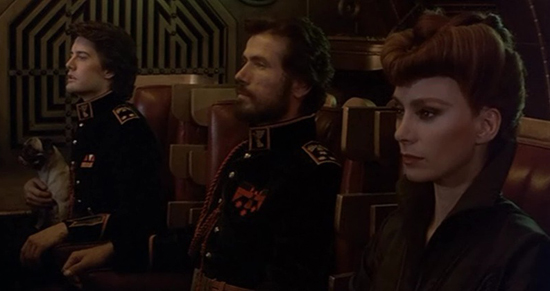
“Arrakis. Dune. Desert planet. Your time has come. A storm is coming. Our storm. And when it arrives, it will shake the Universe.”
The difficulty in taking Dune and translating it for the screen is that no one can match the imagination of Frank Herbert’s writing. He details so much in his novel with regards to the state of his characters thought processes, the many cultural traditions that they adhere to, as well as the epic scale in which he describes the immensity of Arrakis itself. For a movie to work, a filmmaker needs to condense a lot down into something palatable and cinematic to make the narrative work for the screen and that is a lot more daunting than you would imagine. Upon the book’s original publication, it caught the imagination of the counter-cultural movement of the late 60’s, especially with it’s emphasis on using substances to heighten one’s mental awareness. One filmmaker especially interested in Herbert’s novel was Chilean avant garde director Alejandro Jodorowsky. Jodorowsky had an ambitious vision for his take on the novel, expanding Herbert’s themes to represent a more new age spiritualism, and he managed to put together a remarkable cast and crew that included actors like David Carridine, Gloria Swanson, Mick Jagger, Salvador Dali and Orson Welles, as well as artists like Jean Giraud (Moebius) and H.R. Geiger. But, just as the film was entering the final stages of development, the funding dried up and no studio wanted to make it, especially given Jodorowsky’s vision for a 10 hour run-time. Soon after Jodoworsky’s Dune was shelved, the rights fell into the hands of legendary producer Dino de Laurentiis. Laurentiis spent many years of serious development on the project, including having Frank Herbert himself draft a script, but again the project lingered in development hell as the project became too daunting for some. Ridley Scott, hot off the success of Alien (1979), was at one point attached to direct, but he opted to make Blade Runner (1982) instead. So, with the rights about to fall out of their hands, the De Laurentiis Company needed to think outside the box in order to make their project a reality, and their search ultimately led to the most unlikely of candidates; avant garde director David Lynch. Lynch had made a name for himself as a master of the bizarre and grotesque on the silver screen, but science fiction was new territory for him, but he accepted the job nevertheless, seeing the potential to expand his unique vision on a much larger scale than he ever had before, and while it was fortunate for him, it may have been the wrong choice for the story he was about to tell.
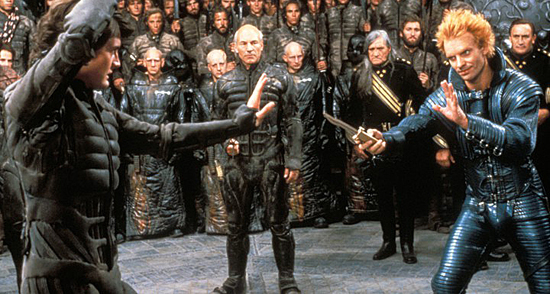
“I must not fear. Fear is the mind-killer.”
Here’s the thing that will jump out the most to first time viewers of David Lynch’s Dune; the movie is a fascinating look at what at what happens when you give a subversive, avant garde filmmaker a big budget to work with, and will please people who are fans of that style. But, if you are someone who has read the book and wanted to see it faithfully brought to the big screen, you will be incredibly frustrated with the results. David Lynch took the job of directing this film and insisted on writing the script himself, even though he had never read the book or was familiar with the story. That lack of insight is palatable when watching the movie because the film cares little about the important things within the novel like character motivations, pacing, establishing a sense of time and place, and so much more. It essentially is David Lynch playing around in a literal and metaphorical sandbox where he gets to indulge in his cerebral weirdness while only using the framework of Herbert’s novel to guide the movie. It’s one of the most bizarre mismatches between director and source material that I think Hollywood has ever seen, and the story really suffers because of it. One of the things that particularly lacks in Lynch’s take on the novel is it’s sense of grandiosity. When you read the novel, you have this sweeping epic of vast expanses of desert and opulent palaces described to you, like something out of a film by David Lean (who was also approached to direct at one point, but quickly refused). Lynch vision works in a more out-of-the-ordinary field which is best realized in movies like Blue Velvet (1986) and Mulholland Drive (2001); creating nightmares made real. His style doesn’t translate into Herbert’s world, because it’s too constrained and focused on the wrong things. He spends more effort portraying the oddities of the world and less on the drama and the character development, and that’s where the movie ultimately fails.
Perhaps the biggest flaw in Lynch’s adaptation comes in the way that it takes narrative shortcuts in order to condense the entirety of Herbert’s novel into a quick 2 1/2 hour run-time. Anyone who was frustrated with the seemingly rushed final season of Game of Thrones would be even more infuriated by the way that Lynch’s Dune jumps ahead through the story without any regard for the story, especially when you’re already familiar with it. To make things worse, he adds this weird internal monologue for every character into the script, having the characters state the obvious in a eerie whispering tone over the action that is taking place. This internal monologue with the characters, by the way, appears nowhere in the novel. What Frank Herbert does is detail what the characters are thinking, but he never has the characters actually voice them out to the reader themselves. It’s something that in many ways can only be done on the page, and it’s an effective tool for authors to add character development that helps the reader identify with the characters more. Herbert even included the effective trick of multiple points of view within his chapters, which allowed him more creative freedom to jump around in the story from one location to another, something that author George R.R. Martin has also effectively used in this Song of Ice and Fire novels, the source material of the Game of Thrones series. But, David Lynch shoehorns the inner monologues in a strangely invasive way that it cheats the movie of any real mystery and holds the characters at a frustrating distance from the viewer. Not only that, but significant plot details are ignored or minimized. Paul is inducted into the Fremen’s ranks with little resistance. Baron Harkonnen’s torture and exploitation of the Arrakian citizens are barely even mentioned. Paul’s love story with the Fremen girl Chani is laughably brushed off in a quick montage. It’s a strange way to adapt such a complex novel and shows just how much more interested Lynch was in indulging his own desires for the story. A longer cut of the movie exists, but it’s one that David Lynch, strangely enough, has disowned, seeing as he prefers the shorter, less faithful adaptation.
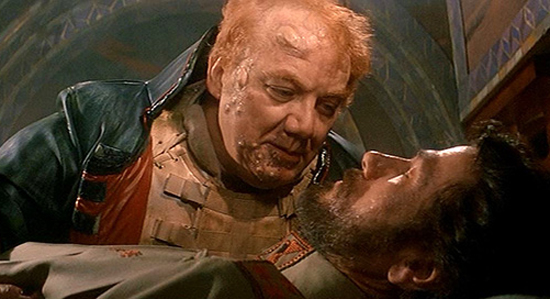
“They tried and failed?” “They tried and died.”
The cast of the movie also represents a problem with David Lynch’s portrayal of the story. Lynch chose actors that less fit the roles they were playing, and fit more into the kind of story he wanted to tell. That’s why you get a more passive portrayal of Paul Atreides through Kyle MacLaughlin. MacLaughlin can be a good actor, and he would go on to have a prolific creative relationship with Lynch years after with both Blue Velvet and the series Twin Peaks. But, his portrayal of Paul is so stilted and uninspired that he makes none of the transformations that the character goes through remotely interesting or surprising. Paul is supposed to be this inspiring figure with supreme intelligence, the finest training in all forms of advanced combat, and charisma that can inspire the revolt of a once forgotten people. Herbert’s writing even offers up the interesting introspection of the character as he realizes that his rise in power and influence will have it’s own dark consequences in the future, as zealots will commit atrocities in his name as he becomes a new god to the known galaxy, based on his foresight into the future. The movie forgets all that and Paul becomes this all powerful figure purely because the plot says so. MacLaughlin does attempt to look the part, despite being several years older than the actual character is in the book, and he does capture some wide eyed wonder that you’d want your protagonist to show in such a fantastic story, but at the end when he claims his status as the Kwisatz Haderach, you are left with this empty sense of what it really means, because nothing up to that point made him special. The movie does better at portraying the villains, who feel more at home in Lynch’s nightmarish vision, though they themselves also feel like they don’t match up with Herbert’s depictions of the characters. Baron Harkonnen should be this morbidly obese, grotesque monstrosity, but instead Lynch cast heavy set but not fat actor Kenneth McMillan, who doesn’t quite command the evil presence in the story that he should, though his hammy acting does help. The movie also slightly elevates the character of Feyd-Ruatha, who goes from a minor villain in the novel to a more significant threat in the film; but that’s only because he’s famously portrayed by recording artist Sting, whose steam bath scene has developed a notorious reputation all on it’s own. Mostly it’s less how Lynch cast his film and more how he wastes characters that fails the film, as important characters like Chani, Kynes, Stilgar, and Alia are brushed aside, because they don’t fit the narrative that Lynch wants to tell.
Lynch’s version of Dune does at times come close to reaching the vision of Herbert’s novel, and it’s largely through the stuff that fits more closely to Lynch’s own tastes. For one thing, the movie thankfully does justice to the one element of the books that the story is most famous for; the mighty sandworms of Arrakis. The sandworms are probably among the most imaginative creatures that have ever been conceived for science fiction, or any fiction really. The are much like the regular earthworms that burrow underneath the soil here on earth, but they grow to an almost unimaginative scale. Imagine if an earthworm were the size of the Empire State Building, and could swallow entire villages whole in it’s gaping mouth full of razor sharp teeth. That’s what the Sandworms of Arrakis are like, and to portray them as any less would be a great insult to the imagination of Frank Herbert. Thankfully, most of the film’s special effects budget went into portraying the worms with the sense of scale that they needed, and the effect is pretty impressive. You really feel the size of these things, and their importance in the story is adequately portrayed, both as a threat and as a necessary component of the ecology of Arrakis. Being the primary native species of the planet, everything on the planet revolves around the worms, including the production of the spice. Lynch’s portrayal of the introduction of these creatures is the one point in the movie that lines up exactly with the novel. Duke Leto and Paul Atreides are taken to observe production at a spice mine, only to have a worm sighting cut their visit short. They watch in amazement as the vast jaws of the monster rise out of the surface of the sand and swallows the mine factory whole. It’s an unforgettable scene in both the book and movie, and I do give Lynch the credit for doing that part justice. But, even despite the effectiveness of the worms, the rest of the movie feels unimaginative. The ducal palace of the capital city Arakeen feels uninspired, as it is literally just hallways carved into rock, and Baron Harkonnen’s industrial inspired palace feels like it belongs in another movie entirely. The costuming also is basic and unimaginative, as the water preserving stillsuits just look like glorified scuba gear. It all falls to the fault of misplaced ambition in the story-telling, as some parts of the movie get due respect, while others are treated as an afterthought.
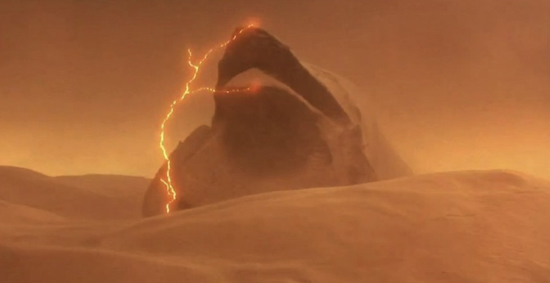
“We have wormsign the likes of which God has never seen.”
I haven’t even touched upon all the other bizarre creative choices that plagued Lynch’s version of Dune, including the odd choice of rock band Toto to do the music (yes, the same guys who sung about blessing the rains down in Africa). Long story short, David Lynch was never the ideal choice to bring Dune faithfully to the big screen. And that was well reflected in it’s reception. The movie was a critical and box office failure. Strangely enough, the movie was heavily criticized for being a pail imitation of the more celebrated Star Wars (1977). Which is ironic since Dune the novel was one of the inspirations for George Lucas with his own story, and there are many parallel elements found in both; the desert planets of Arrakis and Tatooine, both Paul Atreides and Luke Skywalker learning to master their super powerful abilities, grotesquely fat antagonists with Baron Harkonnen and Jabba the Hutt, an evil empire, the list goes on. The legacy of Frank Herbert’s Dune can in fact be felt in most modern science fiction, and quite honestly it’s Lynch’s film that shares the least of that impact. One surprisingly influential byproduct of the novel’s legacy was Jodoworsky’s unmade version. All of the pre-production material made for the movie has since been visual inspiration for a number of other things. H.R. Geiger, who first worked on designing for Dune would later famously provide the visual look for Ridley Scott’s Alien, including the now famous design of the xenomorphs, which were actually spiritual successors to designs he made earlier for Jadoworsky. There was an incredible 2013 documentary made about Jodoworsky’s Dune that your should definitely check out. Also, even after another long development period, we seem to now be getting a new adaptation coming soon that will attempt to more faithfully adhere to Herbert’s vision. After directors like Terry Gilliam, Peter Jackson, and Peter Berg all flirted with the project before dropping out, Denis Villeneuve (Sicario) is the one now tasked with the job, and he seems to be taking the role very seriously. The cast he’s assembled, including Timothee Chalamet, Stellan Skarsgard, Josh Brolin, Rebecca Ferguson, Oscar Isaac and Javier Bardem is one of the most impressive in recent memory, so a lot of hopes are high for this one. Though David Lynch’s Dune has a somewhat small cult following, most people view it as a cautionary tale of how not to adapt a complex science fiction epic into such a narrow and uncharacteristic mold. Frank Herbert’s masterpiece is a story that demands a grand cinematic treatment, and with David Lynch what we got instead was weirdness for weirdness sake. And great science fiction rises above the confines of weirdness, and makes the reader and the viewer find truth in the unbelievable, which is exactly the majesty found in the pages of Dune.
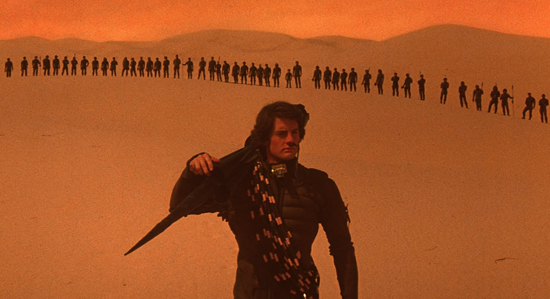
“And how can this be? For he is the Kwisatz Haderach!”